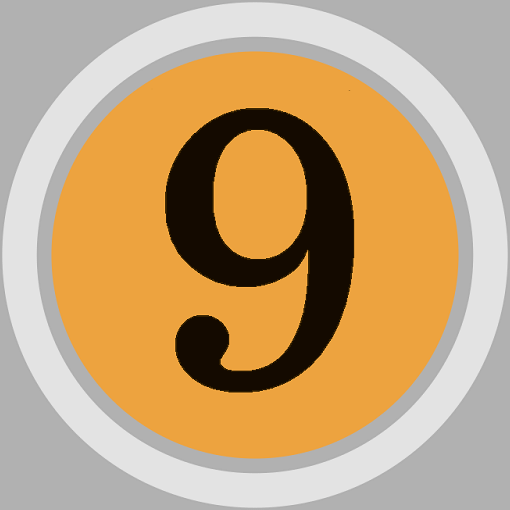NINE

"If you only knew the magnificence of the 3, 6 and 9, then you would have a key to the universe." - Nikola Tesla
Latvian "deviņi" is very similar to a Latvian word for GOD (Dievs). Could then this number be associated with the gods and be their special chosen number?
A number of all existing worlds in the Norse mythology is 9. Every ninth year people from all over Sweden assembled at the Temple at Uppsala. There was feasting for nine days and sacrifices of both men and male animals according to Adam of Bremen.
According to the very late Trollkyrka poem, the fire for the blót was lit with nine kinds of wood. Odin's ring Draupnir releases eight golden drops every ninth night, forming rings of equal worth for a total of nine rings.
When Odin sacrificed himself to himself, he hung upon the gallows of Yggdrasil for nine days and nights. In return, he secured rúnar "the runes, secret knowledge".
There are nine surviving deities of Ragnarök, including Baldr and Hödr, Magni and Modi, Vidar and Váli, Hoenir, the daughter of Sól and a ninth "powerful, mighty one, he who rules over everything".
In Kalevala it is said that the Ether has 9 regions. There are also 9 diseases most feared by mankind.
The plague sent by Apollo in Iliad lasted for 9 days. The sacred number of Zeus was 9.
NI-
English: nine
Novial: nin
Danish: ni
Norwegian: ni
Gothic: 𐌽𐌹𐌿𐌽 (niun)
Old Frisian: niūgun
Old English: nigon
North Frisian Sylt: niigen
Swedish: nio
NE-
Old Prussian: newīnts (nevints)
Zazaki: new
Dutch Low Saxon: negen
German Low German: negen
Afrikaans: nege
Dutch: negen
North Frisian Helgoland: neägen
French: neuf
Norman: neuf
German: neun
Kurdish Kurmanji: neh
Albanian: nëntë
Pashto: نهه (nëhë)
Ligurian: nêuve
Luxembourgish: néng
NA-
Mitanni: na-a-[w]a-, nāva-
Chakma: na
Assamese: ন (na)
Oriya: ନଅ (na'a)
Sanskrit: नवन् (navan)
Sinhalese: නවය (navaya)
Yagnobi: нав (nav)
Gujarati: નવ (nav)
Breton: nav
Cornish: naw
Wakhi: naw
Welsh: naw
Sogdian: nawmyk (naumik) ("ninth")
Urdu: نو (nau)
Marathi: नऊ (naū)
Nepali: नौ (nau)
Hindi: नौ (nau) (numeral: ९)
Punjabi: ਨੌਂ (nauṅ)
Irish: naoi
Scottish Gaelic: naoi
Vilamovian: naojn
NO-
Latin: novem
Corsican: novi
Galician: nove
Italian: nove
Portuguese: nove
Venetian: nove
Sicilian: novi
Romansch: nov, nouv
Aragonese: nou
Bengali: নয় (nôyô) (numeral: ৯)
Catalan: nou
Aromanian: noauã
Kurdish Sorani: نۆ (no)
Persian: نُه (noh) (numeral: ۹)
Romanian: nouă
Sardinian: noe, noi, nobe
Campidanese: noi
Walloon: noûf
Occitan: nòu
NU-
Tocharian A: ñu
Tocharian B: ñu
Dalmatian: nu
Sogdian: nw (nu), nwa (nua)
Dhivehi: ނުވަ (nuva)
Tajik: нуҳ (nuh), нӯҳ (nüh)
Spanish: nueve
Umbrian: 𐌍𐌖𐌅𐌉𐌌 (nuvim)
Ladin: nuef
Asturian: nueve
Aragonese: nueu
Manx: nuy
Friulian: nûf, nûv
North Frisian Mooring: nüügen
NI-
Faroese: níggju
Icelandic: níu
West Frisian: njoggen
Saterland Frisian: njuugen
North Frisian Föhr-Amrum: njüügen
IN- EN-
Armenian: ինը (inə), ինն (inn)
Greek: εννέα (ennéa)
Balto-Slavic DEV-
Old Church Slavonic: девѧть (devętĭ, dievęć)
Polish: dziewięć
Serbo-Croatian: девет, devet
Upper Sorbian: dźewjeć
Lower Sorbian: źewjeś
Slovene: devét
Czech: devět
Bulgarian: де́вет (dévet)
Slovak: deväť
Silesian: dźewjyńć
Kashubian: dzewiãc
Russian: де́вять (dévjatʹ)
Rusyn: де́вять (dévjatʹ)
Ukrainian: де́в'ять (dév'jatʹ)
Latgalian: deveni, devenis
Lithuanian: devyni, devynios
Latvian: deviņi, deviņas
Belarusian: дзе́вяць (dzjévjacʹ), дзявя́цера (dzjavjácjera)
DIV-
Polabian Drevani: diwiangt (Jan Potocki relation in 1795)
Article created on the 21st of June 2018.
